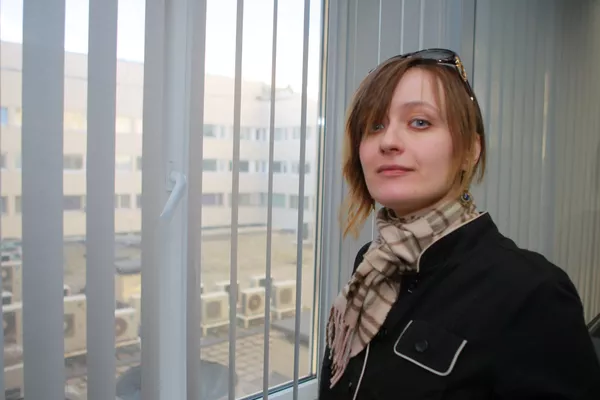This week, Lenta.ru published a letter from Pussy Riot’s Nadezhda Tolokonnikova, who is serving a two-year sentence in a penal colony for having participated in a “punk prayer” in Russia’s main cathedral back in the winter of 2012.
Tolokonnikova is serving her time in a Mordovian penal colony, and her letter details her reasons for going on hunger strike. She describes cruel punishments, working 16- to 17-hour days sewing police uniforms (and hardly being paid for this work – all of which constitutes breach of Russia’s Labor Code), having her life threatened, being forced to go hungry, unsanitary bathroom conditions, and other indignities and tortures of life behind bars.

According to Tolokonnikova, the Mordovia Region is particularly famous among inmates for having some of the most inhumane living conditions imaginable. “If you haven’t served time in Mordovia, you haven’t served time at all,” the saying goes.
Tolokonnikova’s letter is extremely detailed and full of dark humor. She describes how the female inmates are forced to wash their genitals practically on top of each other – and how they refer to their vaginas as their “providers,” an apparent reference to prostitution and trading sex for survival. This is just one of the many vivid and, for most people, shocking particulars of Russian prison life.
Of course, it is likely that much of what Tolokonnikova says will fall on deaf ears. People may be shocked, sure – but it isn’t likely that they will be spurred to any significant action. Most Russians think of the prison system as a place of humiliation, as opposed to rehabilitation, and they are far from alone in this.
In fact, as I read Tolokonnikova’s letter, I couldn’t help but think of the so-called “prison-industrial complex” in the United States – and the way in which cries for reform in that sector are plainly ignored by the majority of the American public.
US prisons are notorious for overcrowding, rape and other forms of violence. They are also being privatized – with public facilities falling into the hands of third parties keen on making money. Today, prisons are considered a solid investment option by many people representing corporate interests – which means that the United States will likely retain the dubious honor of having the world’s highest incarceration rate for decades to come.
It’s pointless, of course, to engage in any kind of whataboutism as far as Tolokonnikova’s letter is concerned. Decrying conditions in US prisons won’t make the lives of Russian inmates any better. Instead, what is happening in the US makes me feel rather grim as far as Tolokonnikova’s prospects are concerned – especially because I believe that the Russian public and the US public hold oddly similar views on the issue of incarceration. The average Russian may mistrust the criminal justice system way more than the average American does – but when it comes to the people actually stuck behind bars, the prevailing attitude seems to be that “if they were stupid enough to end up there in the first place, we shouldn’t care about them.”
When mass murderer Anders Breivik went on trial for his horrific crimes in Norway, both my Russian and American friends decried the comparatively humane Norwegian criminal justice system and prison conditions. “The dude won’t even die for his crimes!” my American friends kept saying. “The dude’s prison cell will look like a freaking hotel room!” my Russian friends intoned.
I have no sympathy for Breivik, but it’s important to note that he does not represent the average prisoner in any country. And the reaction of both Russians and Americans to his case is particularly telling as far as prison reform is concerned.
Most people who are behind bars didn’t wind up there because they mercilessly shot a bunch of children. Many of them are in there for pretty petty offenses or, like Tolokonnikova, because they caused offense. If we truly believe that they deserve to regularly go hungry, work without bathroom breaks, and get beaten and/or sexually assaulted if they fall out of line somehow – then we are in serious trouble.
Trendwatching in Russia is an extreme sport: if you’re not dodging champagne corks at weddings, you’re busy avoiding getting trampled by spike heels on public transportation. Thankfully, due to an amazing combination of masochism and bravado, I will do it for you while you read all about it from the safety of your living room.
Natalia Antonova is the acting editor-in-chief of The Moscow News. She also works as a playwright – her work has been featured at the Lyubimovka Festival in Moscow and Gogolfest in Kiev, Ukraine. She was born in Ukraine, but spent most of her life in the United States. She graduated from Duke University, where she majored in English and Slavic Literature. Before coming to Moscow, she worked in Dubai, UAE and Amman, Jordan. Her writing has been featured in The Guardian, Foreign Policy, Russia Profile, AlterNet, et al.
Trendwatcher: Nerds Gone Wild: Argument Over Philosopher Kant Ends in Shooting
Trendwatcher: Moscow’s Aging Voters Defeat Its Apathetic Youth
Trendwatcher: Glamorous Fraudsters and Debt Suicides
Trendwatcher: The Scandalous Truth About Russian Men
Trendwatcher: Of Russian Tourists, Egyptian Violence, and Fate
Trendwatcher: Moscow’s Migrant Problem – And Lack of Community
Trendwatcher: Mizulina, Gay Activists – And Fame
Trendwatcher: Navalny and the Train Station Blues
Trendwatcher: Russia, Self-Defense and Trayvon Martin
Trendwatcher: Expat Women in Moscow: When Dating is No Disaster



